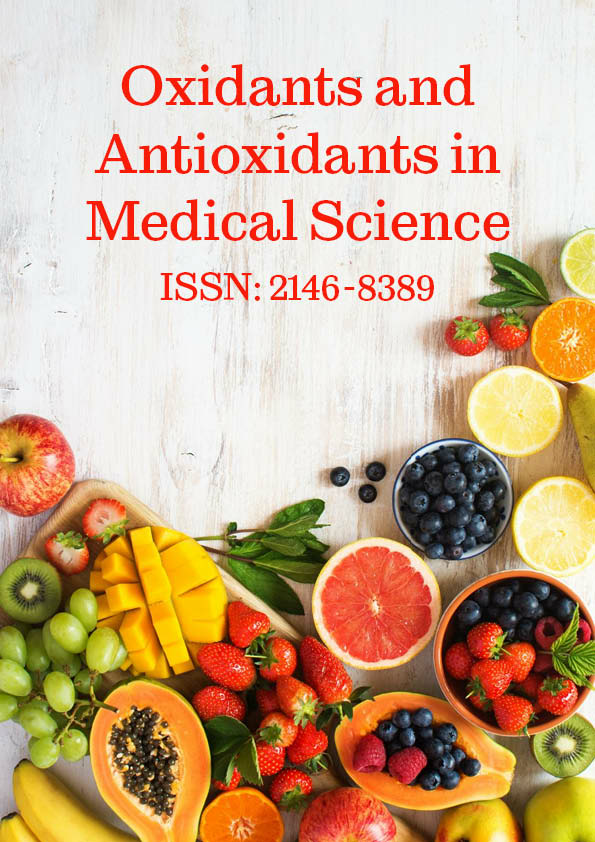Perspective - Oxidants and Antioxidants in Medical Science (2022)
The Importance of Antioxidants in the Treatment of Ulcers
Gius Zach*Gius Zach, Department of Chemistry, University of Auckland, Auckland, New Zealand, Email: gius.zach@gmail.com
Received: 02-Mar-2022, Manuscript No. EJMOAMS-22-55849; Editor assigned: 04-Mar-2022, Pre QC No. EJMOAMS-22-55849(PQ); Reviewed: 18-Mar-2022, QC No. EJMOAMS-22-55849; Revised: 23-Mar-2022, Manuscript No. EJMOAMS-22-55849(R); Published: 30-Mar-2022
Description
The aetiology of gastro duodenal ulcers is influenced by a variety of aggressive and protective factors such as acid- pepsin secretion, parietal cell, mucosal barrier, mucus secretion, blood flow, cell regeneration, and chronic immune agents (prostaglandins and epidermic growth factors).
The active forms of oxygen produced by the metabolism of arachidonic acid, platelets, macrophages, and smooth muscle cells may contribute to gastric mucosal damage. Therefore, by releasing free radicals, active oxygen metabolites may be helpful in protecting the gastric mucosa from oxidative damage or accelerating the healing of stomach ulcers.
Several mucosal defense mechanisms protect the stomach and duodenum from harmful agents. Antioxidants act as radical scavengers, prevent lipid peroxidation and other free radical-mediated processes, and thus protect the human body from a number of diseases caused by radical reactions. Many substances have been suggested to act as antioxidants. Various phenolic antioxidants such as flavonoids, tannins, coumarins, xanthenes and, more recently, procyanidins have been shown to kill radically-dependent radicals and are therefore considered a promising treatment for radical pathology for free.
The therapeutic properties of folk plants are mainly due to the presence of flavonoids, but they can also be influenced by other organic and inorganic compounds such as coumarins, phenolic acids and antioxidant micronutrients. Eg: Cu, Mn, and Zn.
Flavonoids and other polyphenols are part of the newly developed phytochemicals, chemicals found in plant substances that have potentially beneficial effects on human health. Compounds are known as secondary plant metabolites, which is a term that indicates that most of these substances are considered insignificant and are therefore secondary in function.
Among the main potential causes of potential flavonoid health benefits is their antioxidant activity. Numerous in vitro studies have shown that flavonoid can remove peroxide, hydroxyl and peroxyl radicals, affecting various steps in the arachidonate cascade with cyclooxygenase-2 or lipoxygenase. In addition to these important effects, they have properties to stabilize the membranes and also affect certain processes of central metabolism and prevent lipid peroxidation in various systems. Some of them have been shown to increase the mucosal content of prostaglandin and mucus in the gastric mucosa, indicating cytoprotective effects. Several of them prevent gastric mucosal ulcers produced by various models of testicular ulcers and protect the gastric mucosa from various necrotic agents.
Several mechanisms may contribute to the antioxidant activity of flavonoids in addition to free radical release, i.e., degradation of metallic ion, inhibition of oxidant enzymes or the production of free radicals by cells, and reactivation of a tocopherol from -tocopheroxyl radicals. They promote the formation of gastric mucosa, reduce mucosal acid release, inhibit pepsinogen production and reduce ulcerogenic ulcers.
Active compounds of herbs, flavonoids, triterpenes and tannins may be considered effective compounds against stomach ulcers by acting as protective factors or increasing antioxidant activity.
Sources
Spices and herbs are considered to be sources of natural antioxidants that can protect against oxidative stress and thus play an important role in preventing chemoprevention of diseases caused by lipid peroxidation.
Turmeric, cinnamon, ginger and garlic a variety of spices and herbs are powerful health sources that benefit from antioxidants and show powerful anti-bacterial and anti-inflammatory properties to support wound healing.
Common fruits suitable for stomach ulcers are apples, blueberries, berries, black berries, strawberries, cherries, and black peppers. Studies have shown that these foods carry polyphenols that help the gastric mucosa heal faster or kill bacteria such as H. pylori.
Copyright: ©2022 The Authors. This is an open access article under the terms of the Creative Commons Attribution NonCommercial ShareAlike 4.0 (https://creativecommons.org/licenses/by-nc-sa/4.0/). This is an open access article distributed under the terms of the Creative Commons Attribution License, which permits unrestricted use, distribution, and reproduction in any medium, provided the original work is properly cited.







